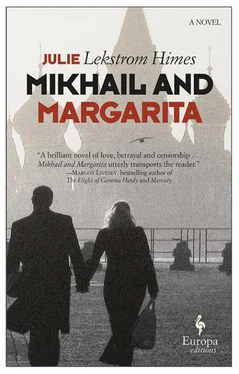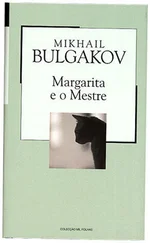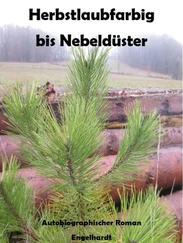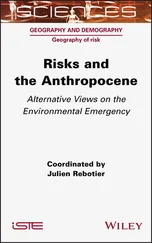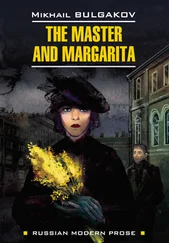“How many years has it been?” he asked, as though such a thing must be incalculable.
“Thirty.”
“Thirty.” Pavel shook his head. The number itself seemed tragic. Half a man’s lifetime.
There were only a few things that might estrange a brother from a brother. Perhaps only one. Yet Pavel smiled, as if determined to overcome any obstacle. “I will take you home,” he said. “We will share a meal.”
“Sure. I’ll come,” said Ilya.
They were both suddenly quiet in the face of his lie. Somewhere in the back of the small room, a primus flame hummed. There was no photograph of her on his desk. There was a telephone but Pavel’s gaze passed over it. He could wait to tell her, thought Ilya. In fact, it was unlikely he’d tell her at all. Olga.
The wood grain of the desk was marred by a watermark. It’d been there when it was Ilya’s desk. “You’ve done well?” Ilya asked.
“I’ve had the burden of trying to live up to the reputation of my older brother.”
“Children?” It seemed a required question.
Pavel shook his head. “She couldn’t.” The years of heartbreak that went with that would go unspoken.
“And Olga?” Was this required as well?
“She is fine,” said Pavel. His brief smile sealed that avenue from anything further. “Did you marry?”
Ilya shook his head. What was there to say, other than it was long ago. Even that seemed needless.
Perhaps on this point Pavel agreed. He gestured expansively. “And now my important brother has returned for a visit.”
Ilya had wanted information about Pyotrovich; he wanted it badly enough to risk this trip to the police station. To risk seeing his brother, though Pavel was not a threat. To risk seeing her—even in a photograph. He wondered vaguely if this visit might implicate Pavel in some way. It was unlikely the room was wired. Pavel appeared to have no concerns.
The blowing whistle of a kettle sounded and Pavel got up to prepare tea. Watching him go through the mechanics provided a breath of normalcy. His gait was lumbering, perhaps painful, and Ilya noticed a limp. This was new—new in the last thirty years, and he felt some small guilt for failing to know of it, for his part in the silence between them.
“I wrote you about Mother,” said Pavel, his back turned. There was the mildest sense of rebuke in his voice.
“It found me eventually.”
“I wasn’t certain.”
At the time it’d seemed to have arrived from a different world. “It was nearly summer when I got it,” said Ilya.
“Mail was tricky then.” He paused. “I’ve always wondered when I would see you again.”
In his motions the sense of their mother returned more sharply. The quiet of her disappointment in his setting aside of family, her questioning of this; it would have been a personal thing. When his brother turned, he held a cup in each hand.
Pavel’s gaze seemed to stop short; it focused on his mouth.
“Do you still take milk? I have some powdered in the cabinet,” he said.
When they were children, Pavel had always been able to find him. Even when alone in the forest, desiring the quiet of his own thoughts; even then, Pavel would appear, as though his brother’s wanderings were mapped on his heart.
Pavel set the cups on the desk. One covered the water-mark. He sat down heavily.
How easily they slipped into familiar patterns, as though they’d done this every morning. Time seemed a flimsy thing. What ran in one’s blood that allowed for this?
Pavel sipped his tea. His lips retracted from the hot liquid. “You might want to let it cool a bit,” he said. He glanced at the telephone.
Ilya fingered the cup. It had begun to snow.
For thirty years he’d thought his brother happy. The master of happiness. Supreme in this. It had been enough to keep him away.
But something was wrong. “What happened to Olga?” said Ilya.
Pavel watched the steam rise up from the cup. “She died about a year after you left.”
All that time he’d imagined the world with her somewhere in it. How could he not have known? Behind them the whirring of some small office machine could be heard.
“Pyotrovich has been here twice,” said Pavel, touching the cup’s edge. “Unpleasant man. What is it they say about promotions? There is always one too many?”
He remembered her scarlet cap, a blot of blood in the snowy tableau. He remembered her slender arm extended, her gloved fingers holding the small ring, his betrothal gift to her. Her words had been forgotten. Snow fell between them; perfect crystals alighted on the velvet cloth as though grateful for that brief privilege, then were gone forever.
Come with me, he’d said. He meant, If you love me, you will come with me . It was then that he’d sensed another presence in the woods, a figure in the shadows. Someone waiting to take his place.
Ilya stood, all at once anxious to leave.
“Is she as beautiful as they say?” Pavel asked. He smiled a little, as though at long last happy for his brother. As though this was all he’d ever wanted.
What was the distance between having everything and having nothing? A span of decades, a matter of seconds? What was the difference between having everything and having nothing? He could not answer; he could not tell them apart.
The hut was dimly lit, the fire low amid embers. Ilya stood in the doorway. The night at his back, bitterly cold, was trying to get in.
“Marry me,” he said. His voice hung oddly in the quiet room. He took his hat in his hand; the other held the doorframe.
She’d been sleeping, seated in front of the fire. She straightened slightly, blinking. She rubbed the back of her neck.
“I would go out and fetch a priest this moment,” he said. There were no priests to be found, yet the binding quality of a bureaucratic seal seemed lacking for the task.
She was fully awake now. She looked achingly young and in this he felt aged. He could forgive her that. He went onto his knees before her.
“I can take care of you,” he said.
“I never doubted that you would return.” Her arms were crossed over her chest. Once again, he felt the need to take one hand into his, to separate it from the other, as though apart they could be more easily convinced.
“I can make you happy.”
Could he? Her eyes carried that question.
He imagined a snowy forest as though it’d been his to remember; the quiet movements of a man and a woman toward one another. They’d always known, Pavel and Olga, since childhood; it’d run in their blood, yet they had been willing to allow for the grandest of cosmic errors. Perhaps he’d known too, and when he left, he knew that Pavel would blame himself.
“I can make you happy,” he repeated. He could make someone happy.
She took his hand; he could see that she would try to believe him. But the gesture communicated something else. Surely she’d intended to give comfort rather than despair. His talent as an interrogator would not allow for misunderstanding.
Bulgakov was summoned to the Regional Office of the Chief Directorate of Frontier Guards and Interior Troops in Irkutsk. Pyotrovich had established a temporary office on its second floor. It was clear he was dissatisfied with the local contingent. After the clerk had ushered him in, Pyotrovich got up to shut the door himself. “They smile while they’re slipping something unpleasant into your tea,” he said. He sat down again. “At least in Moscow, no one pretends to like each other.”
He expressed surprise that Bulgakov had not heard from Margarita. Pyotrovich did not say how he knew and he studied him as though the cause of this was some flaw which could be rectified by a reasonable improvement in personal hygiene or a new jacket. “It’s possible she’s more under his influence than I’d originally considered. That happens not infrequently—particularly in cases of prolonged association .” His inflection seemed to give the relationship a bureaucratic tone. “Of course those of certain sensitivities are more prone,” Pyotrovich added. These weren’t just Bulgakov’s inadequacies.
Читать дальше
